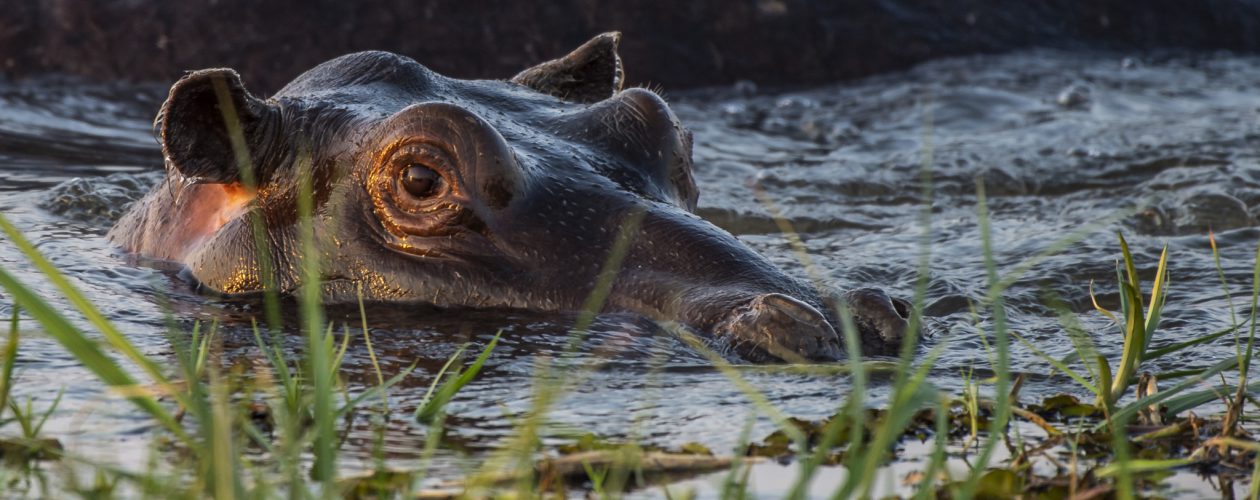Safaris may be more structured than other vacations, but with an understanding of the routine, you can tailor the daily plan to fit your needs (even if you can’t arrange the whole day according to your whim). Camp staff are generally as accommodating and flexible as possible. Additional activities can also be arranged but be reasonable with your requests: your guides have a long working day, from dawn until after dinner, and their breaks are well earned. Ultimately, life in a lodge is centered on you having the most enjoyable and successful safari possible.
5:00 to 6:00 am – Wake up with the animals
Game drive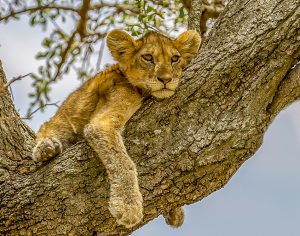 s occur early morning and late afternoon, when the light is rich and animals are not hiding from the searing midday sun. This highly logical behavior forms the basic structure for safari camp life. You’ll be woken in your tent or chalet by staff bringing tea or coffee (place your order the night before) and a basin of hot water for washing (if you don’t have running water in your room/tent). Alternatively, hot drinks and rusks might be served in the dining area or round the fire before the morning’s game drive, walk or mokoro (dugout canoe) activity.
s occur early morning and late afternoon, when the light is rich and animals are not hiding from the searing midday sun. This highly logical behavior forms the basic structure for safari camp life. You’ll be woken in your tent or chalet by staff bringing tea or coffee (place your order the night before) and a basin of hot water for washing (if you don’t have running water in your room/tent). Alternatively, hot drinks and rusks might be served in the dining area or round the fire before the morning’s game drive, walk or mokoro (dugout canoe) activity.
6:00 to 9:00 am – Morning game activities
The guides will show you the best of the area. Be sure to ask if you have any special requests to see particular places or species. Water and soft drinks as well as tea/coffee and snacks are available. Drink enough to avoid dehydration. On cold winter mornings, the game drive may occur a little later, when the day (and the animals) begin to warm up.
9:00 to 10:00 am – Breakfast
Breakfast is the first test of self-control for the day. Large 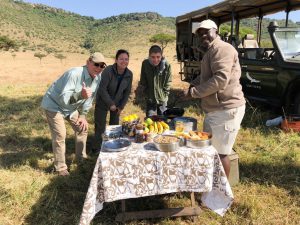 amounts of good food will be laid before you, but as safari life is relatively inactive (unless you’re on a walking safari), several days in camp can feel like a premeditated assault on your waistline. Expect a buffet of cereals, yogurts, fruit, toast, and “The full bacon-and-eggs Monty,” cooked to order. Usually this is served at the lodge, although some camps, especially in East Africa, will vary the routine by including a bush breakfast. Staff will set this up during your game activity. In southern Africa there is an increasing trend towards having longer morning game activities prior to a brunch, a real feast to see you through to afternoon tea.
amounts of good food will be laid before you, but as safari life is relatively inactive (unless you’re on a walking safari), several days in camp can feel like a premeditated assault on your waistline. Expect a buffet of cereals, yogurts, fruit, toast, and “The full bacon-and-eggs Monty,” cooked to order. Usually this is served at the lodge, although some camps, especially in East Africa, will vary the routine by including a bush breakfast. Staff will set this up during your game activity. In southern Africa there is an increasing trend towards having longer morning game activities prior to a brunch, a real feast to see you through to afternoon tea.
10:00 to 12:30 pm – Free time
Tempting as it may be, you can’t go wandering off into the bush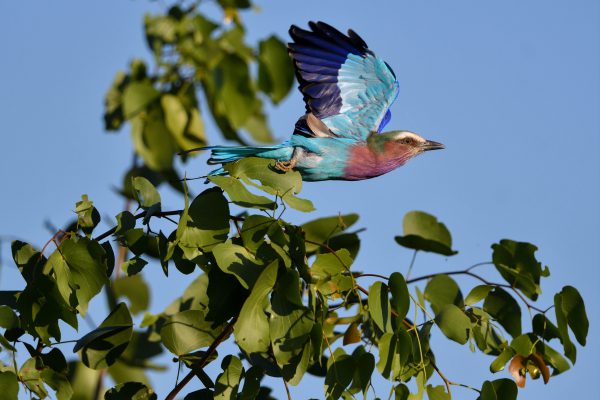 on your own. Most camps or lodges have a small library containing reference books about the bush and wildlife, and possibly novels left by other guests, but it’s advisable to take a couple of your own books. You could play cards or use the time for things you don’t normally have time to do. This is an excellent time for bird watching, as camps are usually constructed in the shade of trees. Many also overlook waterholes and there may be a hide you could sit at. You’ll be surprised how good the game viewing can be at this time of day.
on your own. Most camps or lodges have a small library containing reference books about the bush and wildlife, and possibly novels left by other guests, but it’s advisable to take a couple of your own books. You could play cards or use the time for things you don’t normally have time to do. This is an excellent time for bird watching, as camps are usually constructed in the shade of trees. Many also overlook waterholes and there may be a hide you could sit at. You’ll be surprised how good the game viewing can be at this time of day.
12:30 to 1:30 pm – Lunch
Meals are at set times due to the obvious logistical constraints of preparing feasts over a fire in the bush and of keeping prepared food fresh. Lunch usually comprises a buffet of salads, often with hot options, bread baked in the coals and a choice of desserts. Meals are a good opportunity to chat with other guests; safari go-ers tend to have shared interests and often much in common to keep the conversation lively, interesting and educational. However, if you prefer to dine on your own, camp management will most certainly oblige.
1:30 to 3:30 pm – Siesta time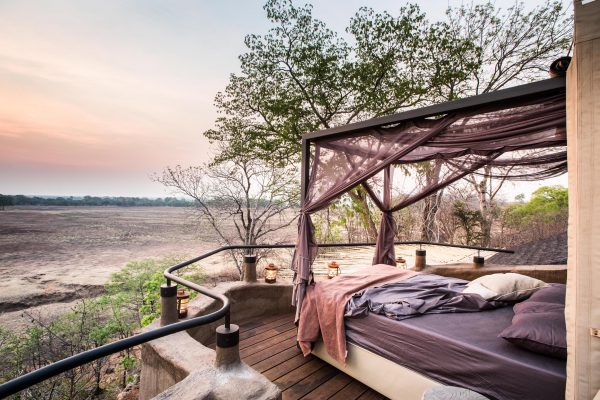
When the heat haze rises, cicadas screech and the sun is directly overhead, all sane living things head for cover. It’s siesta time. Some lodges will have a swimming pool or individual plunge pools to help you cool off. Alternatively, savor the peace and carry on reading and relaxing. Most tents and chalets have private balconies where you can relax in peace and privacy.
3:30 to 4:00 pm – Afternoon tea
Mid-afternoon is traditional afternoon tea – a more typically British than American ritual, but one you will quickly adopt during your days on safari. And even in the remote wilderness it’s as good as it gets. You’re likely to be offered a selection of cakes and other sweets as well as a spread of savory snacks (as if you haven’t eaten much today).
4:00 to 7:30 pm – Game viewing
Evening game drive or walk – a chance to search for a particular 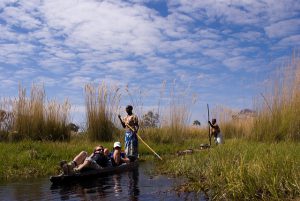 species you haven’t yet seen, or perhaps follow the progress of a pride or herd spotted earlier. Guides usually find a scenic viewing spot for the sublime African sundowner. Dusk is short and darkness comes quickly in Africa, so by the time you’re driving back to camp, you’ll probably be using a spotlight to pick out animals’ luminous eyes and shadowy forms.
species you haven’t yet seen, or perhaps follow the progress of a pride or herd spotted earlier. Guides usually find a scenic viewing spot for the sublime African sundowner. Dusk is short and darkness comes quickly in Africa, so by the time you’re driving back to camp, you’ll probably be using a spotlight to pick out animals’ luminous eyes and shadowy forms.
7:30 to 10:00 pm – Dinnertime
There’ll be about 30 minutes for getting changed and having aperitifs round the campfire. Dinner is usually candle-lit and can be al fresco or within an open-sided dining area, weather permitting. There may be a choice of two or three main course dishes and most lodges are very good at providing a wide-ranging menu during your stay and for being as flexible to food preferences as possible. The food in most camps is excellent and dietary restrictions are well catered for.
10:00 until late – Winding down
The most interesting conversations take place over after dinner 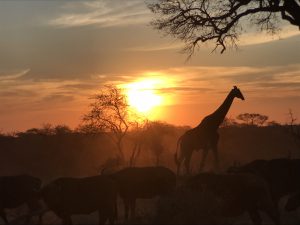 drinks around the fire. Revelry can continue into the night if people are feeling boisterous (staff will stay up as late as you want), but often it feels natural to sleep early, following the rhythms of the bush. In unlit camps, guests may be given flashlights or a lantern for finding their way to their tents, or they may be escorted. By special request, or if there has been an interesting sighting in the area, there may be a night drive. Fall asleep to the chorus of the bush. And while animals generally don’t pass through camp during daytime, they may well do so in darkness, keeping you guessing as to which spoor (footprints) will appear overnight.
drinks around the fire. Revelry can continue into the night if people are feeling boisterous (staff will stay up as late as you want), but often it feels natural to sleep early, following the rhythms of the bush. In unlit camps, guests may be given flashlights or a lantern for finding their way to their tents, or they may be escorted. By special request, or if there has been an interesting sighting in the area, there may be a night drive. Fall asleep to the chorus of the bush. And while animals generally don’t pass through camp during daytime, they may well do so in darkness, keeping you guessing as to which spoor (footprints) will appear overnight.
